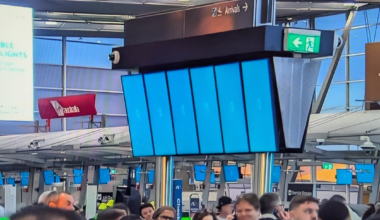Netherlands Work Visa: How To Move And Live In The Netherlands With Work Permit Visa
Netherlands Work Visa: How To Move And Live In The Netherlands With Work Permit Visa
Have you been dreaming to move and live in the Netherlands? Today, We’re going to talk about the Netherlands work visa, which you can apply for and get in just two weeks. You can apply for different kinds of work visas. And each type has its own set of requirements, which I’ll also tell you about.
Also, you can apply even if you are self-employed, a freelancer, or a business owner, which is great. This article is for you if you want to move to the Netherlands, where there are great tech cities like Amsterdam, Rotterdam, and Maastricht.
Now, why would you choose the Netherlands? One of the best places in Europe for tech companies to be is the Netherlands. Amsterdam, the country’s capital and largest city, is also the financial and business center of the Netherlands.
Amsterdam is a well-known tourist destination in Europe. Each year, more than 5.34 million people from outside the country come to visit. Amsterdam is also a top choice for immigrants from all over the world because it has a well-developed tech ecosystem with smart tech solutions and innovations.
The city’s commitment to innovation, its world-class digital infrastructure, and a large number of cutting-edge companies and events make it a paradise for tech professionals. But there are plenty of job opportunities in many other fields besides tech, such as marketing, logistics, sales, human resources, talent acquisition, finance and accounting, and many more. Germany is to the east of the Netherlands, Belgium is to the south, and the North Sea is to the north and west.
It also shares the North Sea with both of those countries and the United Kingdom. Due to its rich soil and mild climate, the Netherlands is the second largest exporter of food and agricultural products in the world. This is because it has made a lot of progress in technology and innovation.
In this article, I am going to talk about the different types of work visas that the Netherlands offers, the requirements for each one, the benefits of the Netherlands work visas, who can apply for them, if your spouse or children can join you, how long your visa will be valid for, and how to apply for it as well.
If a Dutch employer is approved by the IND as a recognized sponsor, a decision on your profile is usually made within about two weeks on whether the employer applies for the Dutch highly skilled migrant permit, the EU blue card, or the ICT transfer. The next great thing is the salary.
READ ALSO: How to Get a Job in Canada
In the Netherlands, the average gross salary is about 36,500 euros per year, which is about 3041 euros per month and 2400 euros after taxes. This number includes paying for vacations and other perks. In the Netherlands, the most common salary is 37,000 euros gross or 27,900 euros net, which includes an 8% vacation allowance.
The minimum wage is set at €1,756 per month, which is about 81 euros per day. Keep in mind that the government changes the amount of the minimum wage twice a year, on January 1st and July 1st. The next benefit is the length of time that a residence permit is granted.
Most of the time, the length of the scheme matches the length of the employment contract. This means that if the employee has a one-year job contract, they will also get a one-year residence permit. If the employee has a contract with no set end date, the Dutch highly skilled migrant permit is given for a maximum of five years, and the EU blue card is given for a maximum of four years.
Both of these permits can be extended as well. The next benefit is that it will be possible to work as an entrepreneur. Since April 1, 2017, people with a Dutch highly skilled migrant permit or an EU blue card can work as an entrepreneur on top of their regular job. However, if they also start their own business, they must continue to comply with the specific conditions of their work visa.
Can you bring family members with you if you have a work visa in the Netherlands? People with most long-term work visas can bring their spouses, partners, and children with them. If you have a short-stay visa or a temporary visa, like a seasonal work visa, your family can’t join you.
Relatives can apply for their own visa or residence permit, and they usually have the same right to work as the family member they are joining. If they do get a job, their employer needs to get them a TWV permit. Next, we’ll talk about who needs a work visa to work in the Netherlands.
Depending on your country of origin, you may need a work permit and a residence permit to start working in the Netherlands. If you’re from an EU or EEA country or Switzerland, you can go to the Netherlands without a work visa or residence permit.
Still, if you want to stay in the Netherlands for more than four months, you have to register with a personal records database in your area and get a Citizen Service number. You also don’t need a Dutch residence permit if you are a family member or a citizen of the EU, EEA, or Switzerland.
READ ALSO: Various Canadian Visa Requirements
However, you will need a certificate of lawful residence to prove that you are living in the country legally. All other foreigners who want to live and work in the Netherlands need a Dutch residence permit and a separate work permit.
Some people can even apply for a single permit which is both a work permit and a residence permit. Here are the requirements for a work visa in the Netherlands. Remember that I said you might need both a work permit and a residence permit to work in the Netherlands.
Work visa requirements in the Netherlands
And the requirements for a Netherlands work visa and residence permit will depend on which of the Dutch work permits you’re applying for. However, there is a set of standard requirements for any Dutch residence visa that you’ll have to meet. For instance, your passport or identity documents must be valid for the duration of your stay.
You must have sufficient financial means. This could mean payslips, salary or bank statements, documents showing that you own shares in a company, or a letter from a benefits agency. You must have health insurance and it has to cover you for the entire time that you will be living in the Netherlands. You must not pose a risk to public order, national peace, or national security. You must provide proof of the purpose of your visit.
For example, an employment contract, a document from a Dutch educational institution, or a marriage or civil partnership certificate. You may have to take a TB test. This should be done within three months of entering the Netherlands. If you don’t take the tests within three months, your residence permit could be taken away.
Types of Netherlands Visa And Work Permits
Now, depending on the Netherlands type of work visa you need, there’ll be additional requirements. Each type of Netherlands work visa has its own set of requirements and conditions.
The first type is for regular paid work as an employee working for a Dutch employer, which may include an employment contract, minimum wage earning, and proof that the position couldn’t be filled by a Dutch or European national.
Self-employed people, freelancers, and entrepreneurs must be able to show that their service or product is innovative and that they have relevant personal experience. They must also have a business plan and be able to show how it benefits the Netherlands.
For people who are self-employed, the requirements for a work visa in the Netherlands are stricter than for other types of work visas. You have to meet certain requirements, and depending on your situation, you may also be able to get a Netherlands startup visa.
READ ALSO: High Paying Jobs In Canada Without A University Degree
For a seasonal labor visa, which is given to people who will be doing seasonal work in the agricultural sector, you will need an employment contract, a single combined residence permit, and a work permit, and you must be making at least the minimum wage.
For inter-corporate or inter-company transfer visas, you can’t be from Europe or Switzerland to apply. You must live outside of the EU before you can apply. You must be a specialist or trainee in management, and your salary must be the same as that of a highly skilled migrant.
You must meet the qualifications and have the experience needed for the job you want. You must spend most of the time of the transfer in the Netherlands. You must have worked for the company for at least three months before you can be transferred.
For highly skilled migrants, you’d need to make at least 3,299 euros if you’re under 30 and 4,500 euros if you’re over 30. If you are older than 30, you will need a contract with a Dutch employer who has been approved by the IND as a sponsor.
If you have a European blue card, your job contract must be valid for at least a year. You need a higher education diploma that is valid for at least three years and has to be evaluated by NUFFIC. And you have to make a certain minimum wage. Netherlands Work Permit Eligibility – How To Apply For Netherlands Work Visa
Now that you know the different types of work visas and the requirements for each, I’ll tell you how to apply for a work visa. When you apply for a work visa in the Netherlands, your nationality and the type of work you will be doing are taken into account.
Depending on the type of work visa you want, you may be able to apply for a single permit that incorporates both your residence permit and work permit. This is called a GVVA, and it can be given for one to three years. Most of the time, your employer has to apply for your work permit or single permit, so you don’t have to worry about anything.
After getting all the documents they need from you, they can do this directly with the IND. The IND will then send the application to the Dutch employment agency. The Dutch employment agency will look at the application and let the IND know what the decision is. Employers in the Netherlands know how the application process works and will be able to take care of everything on their end, so you don’t need to worry about anything.




